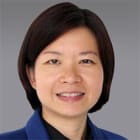commentary Singapore
Commentary: Passion and patience insufficient qualities of an ideal pre-school teacher
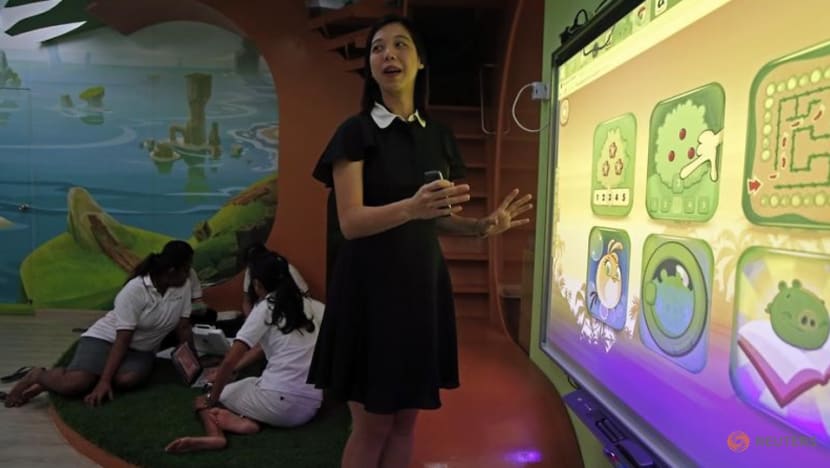
Dreamkids Kindergarten principal Dawn Choy shows how a smart board is used for educational games in class as teachers plan their lessons in an Angry Birds-inspired classroom environment in Singapore in 2015. (File photo: REUTERS/Edgar Su)
SINGAPORE: I am heartened by the National Day Rally’s announcements on the increased government support available for early childhood education.
The landscape has been shifting and growing in positive ways, even if this has been at a measured pace.
Before 2001, there were no national requirements for pre-school teachers in terms of qualifications, nor national curricular guidelines for kindergartens or child care programmes. And the sector was entirely private, either for-profit or non-profit.
Today, edu-carers working with children aged three years old and below and pre-school teachers working with children from 18 months to six years of age are required to hold, at minimum, a Workforce Skills Qualifications professional certificate or diploma qualifications, and meet minimum academic and language competencies.
We now have recommended national curricular guidelines for programmes offered to infants, toddlers and pre-schoolers, as well as a quality accreditation framework for programmes catering to children four to six years old.
Of the existing 1,800 or so child care centres and kindergartens, we have 15 kindergartens operated by the Ministry of Education with more on the horizon.
With the latest announcement, the new National Institute of Early Childhood Development will bring coherence to the certificate and diploma-level professional training landscape.
THREE MORE WISHES FOR EARLY CHILDHOOD EDUCATION
Amid all this progress, what else can we work towards as a nation that is dependent on our people and whose children hold Singapore’s future as precious human capital?
I have in mind three things – for the profession to unite as a community, for it to deepen its knowledge base, and to dispel common myths about the profession.
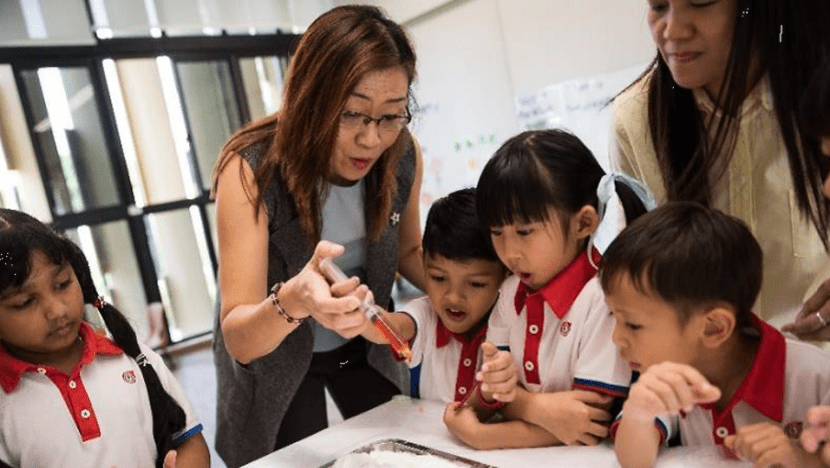
Given the early childhood sector’s previously separated institutions of kindergarten and childcare, the current harmonised sector under the Early Childhood Development Agency is still emergent. The sector has accumulated a diversity of approaches and practices, but it remains a fragmented landscape.
While diversity has its advantages, the profession needs to grow into a more unified community with opportunities to learn together, to debate professionally, and to create a shared voice when advocating for young children’s well-being and development as learners and citizens.
In several countries, early childhood educators are members of professional associations, whether national or regional. Membership allows them to participate in or organise any number of learning activities, for example, conferences, debates, online book clubs, subscription and contribution to journals, and field visits.
In Singapore, the oldest association that I am aware of is the Association for Early Childhood Educators, Singapore (AECES). It started in 1999 as a result of the merger of the Pre-School Teachers Association formed in 1975 and the Association for Child Care Educators formed in 1990.
Belonging to a professional association is a way to move the profession towards greater unity.
Members of professional organisations get to play a part by contributing and sharing knowledge.
AECES itself has given back and developed a Code of Ethics Handbook for Early Childhood Professionals. More recently, in collaboration with Workforce Singapore, it has created a SkillsFuture Career Advisor programme, to connect potential jobseekers interested in joining the field with centre leaders, pre-school teachers and curriculum specialists, to help them make informed decisions about entering the profession.
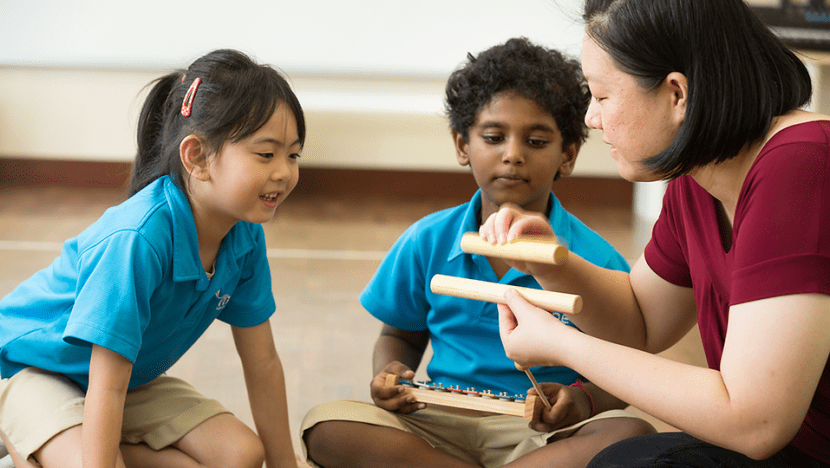
PRE-SCHOOL PROFESSION NEEDS SHARED VOICE AND MISSION
For the profession to grow a shared voice and mission, it should also continually strengthen its professional knowledge to raise its status. This is crucial especially since the field of early childhood education in Singapore has not been an area of intensive study in higher education, or strongly associated with a wide range of research endeavours.
As such, there remains an uncritical view of methods of teaching and how they connect with theories, and there is under-exposure to international literature and research.
Globally, early childhood systems elsewhere have stopped searching for the one best curriculum after a few decades of research.
There is a realisation that quality learning is more dependent on having teachers and leaders who act as curriculum designers with their depths of knowledge, flexible minds, positive dispositions and clear philosophies.
In our emergent early childhood landscape, there remains unproductive assumptions about what it means to work with large groups of young children.
For instance, the staff-child ratio is 1:25 in the Kindergarten Two classrooms and 1:8 for the toddler groups. With such ratios, the assumption is that what is used in primary education can also apply to pre-schools – which is to have children engage in whole-group activities or seat work for long durations.
But this is not appropriate for their age. We know that many young children are not wired to sit and listen or wait for long periods of time. We also know that they are also not engaged when responding to drill-and-practice methods that may work better with older learners.
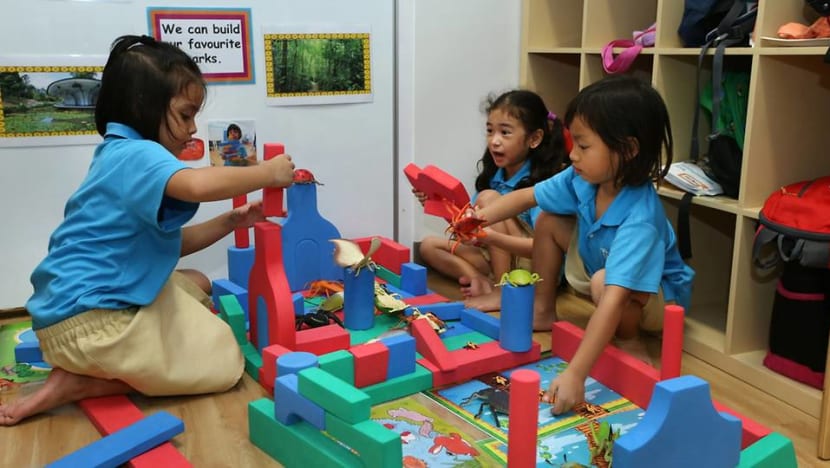
Therefore, engaging groups of young children requires skilled and knowledgeable professionals. The quality of children’s learning experiences is highly dependent on their teachers’ choice of spoken words, gestures, thoughts and actions including the myriad decisions about what materials to put out and how to use time and space.
When all this is done with artful expertise, just like a professional dancer who makes his craft look easy, anyone who walks into a classroom can sense the excitement of learning.
Contrary to popular belief, early childhood professionals do more than ensure that children are safe and fed.
NOT A BABY-SITTER
Finally, early childhood professionals should work towards replacing the commonplace baby-sitter image.
To do so, the profession needs to come together to dispel the myth that passion and patience are supposed to be its dominant characteristics.
The Oxford dictionary defines “patience” as the “capacity to accept or tolerate delay, problems, or suffering without becoming annoyed or anxious” while “passion” is defined as “an intense desire or enthusiasm for something” or even a “strong and barely controllable emotion”.
Based on these definitions, patience seems to be key when situations are unbearable and passion could waver.
Both of these can run dry and they are certainly not the main characteristics of more than a century’s worth of early childhood professional legacy filled with well-known thinkers, social advocates, psychologists and educators such as Johan Pestalozzi, Maria Montessori, Patty Smith Hill, Caroline Pratt, John Dewey and Jean Piaget.
Many of these influential professionals have left their mark in creating a globally-known knowledge base for early childhood education, often modified by specific cultural needs and practices within nations.
Yet none of them advocate patience or passion as necessary ingredients to be a good pre-school educator.
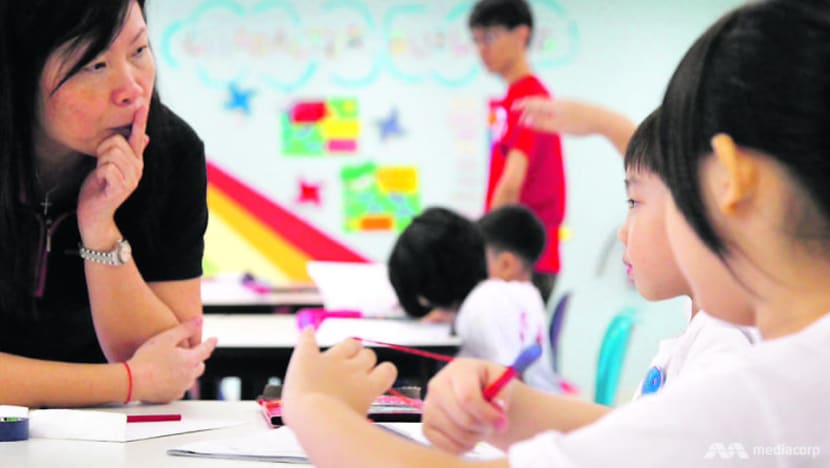
The crux of what makes a good pre-school educator is this - effective teachers must possess all the positive dispositions that we want for children, such as perseverance, curiosity, collaboration, and reflectiveness.
Passion and patience aren’t going to cut it.
In order to help instil a love for learning in our young children, they themselves also need to be self-engaged learners so they become increasingly:
- Knowledgeable about how young children grow and learn, and are able to make the learning process visible and malleable to all adults
- Aware of the strengths and limitations of different developmental theories that discuss ways to educate children, and are critically reflective of their own practices
- Keen to learn about recent scientific studies and approaches to individualise learning for different children
- Intentional in supporting our children’s development of lifelong dispositions and executive functions, including focus, attention, perspective-taking, communication and problem-solving, through play-based and real-world experiences.
Early childhood education is a professional field with a legacy of research and practice. It is not founded on passion or patience, but on a growing professional knowledge base that increasingly cuts across disciplines including education, health, philosophy, psychology and sociology.
It is only when the local early childhood profession functions as a unified body of knowledgeable practitioners that it can become a stronger voice and advocate for children’s well-being and play-based learning.
Dr Sirene Lim is the academic lead for the School of Human Development and Social Services’ Early Childhood Education Programme at the Singapore University of Social Sciences.
This is the sixth commentary in Channel NewsAsia’s series on learning and education.
- Read the first commentary on whether Singapore schools should adopt digital textbooks here.
- Read the second commentary on how Singapore teachers should manage issues on race in the classroom here.
- Read the third commentary on whether our young need expensive enrichment classes here.
- Read the fourth commentary on the struggle parents face in choosing a good school for their child here.
- Read the fifth commentary on the role parents must play in their child's pre-school years here.









